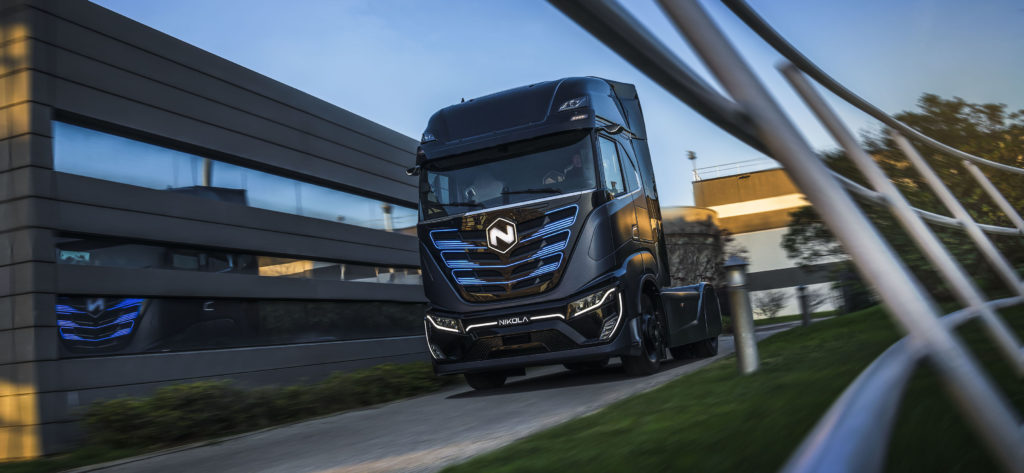Nikola is highlighting reasons to remain optimistic about its zero-emissions strategy after its founder stepped down due to fraud allegations, its stock tanked and an SEC investigation was opened.
Less than two weeks after Nikola Corp. founder and executive chairman Trevor Milton stepped down amid accusations of fraud and deception, on Sept. 30, Nikola issued the following statement highlighting key elements of the company’s strategy and vision moving forward.
“Nikola is a technology disruptor and integrator, working to develop innovative energy and transportation solutions. We are pioneering a business model that will enable corporate customers to integrate next-generation truck technology, hydrogen fueling infrastructure and maintenance,” the company said in the statement. “By creating this ecosystem, Nikola and its strategic business partners and suppliers can pave the way as global leaders in zero-emission transportation — and, together, leave the world a better place.”
In its statement, Nikola highlighted the three business units in which it operates:
- Trucks: Developing and commercializing battery-electric (BEV) and fuel cell electric vehicle (FCEV) Class 8 trucks for the short-haul, medium-haul and long-haul trucking sectors.
- Energy: Developing and constructing a network of hydrogen fueling stations to meet hydrogen fuel demand for FCEV, including potential charging solutions for BEV customers.
- Powersports: Developing electric vehicle solutions for outdoor recreational applications.
Nikola also noted that it continues to make progress on and remains committed to the following:
Nikola Tre battery-electric prototypes: In its statement, Nikola claimed it expects the first batch of five prototypes of the Nikola Tre, a 100% battery-electric truck, will be substantially completed at its JV facility in Ulm, Germany, in the next few weeks. The Nikola Tre prototypes will be subsequently bench tested as well as road tested in Germany. “We remain confident in our ability to begin production of the Tre and make it available to customers starting in the fourth quarter of 2021,” the company noted.
Nikola also highlighted its joint venture with IVECO for the Nikola Tre, as well as its partnership with Bosch and FPT Industrial.
As per a strategic partnership announcement with General Motors, the automaker will supply Nikola’s Class 7 and 8 trucks with fuel cell technology and manufacture the Nikola Badger pickup. GM has an 11% stake in Nikola, which at the time was valued at $2 billion. The NKLA stock on the Nasdaq has plummeted by roughly 60% since being traded at $50 on Sept. 8.
The deal was supposed to close on Sept. 30, but amidst the allegations of fraud and investigations by the Securities Exchange Commission and the U.S. Department of Justice, that did not happen.
On Sept. 29, GM stated: “Our transaction with Nikola has not closed. We are continuing our discussions with Nikola and will provide further updates when appropriate or required.”
The Detroit Free Press posited that GM may be renegotiating a more favorable deal. Either side can terminate the 10-year contract if it does not close prior to Dec. 3, according to the SEC filing.
In a statement released on Sept. 30, JP Morgan referred to Nikola’s partnership with GM as “a stress-test for the company.” “We acknowledge that CNH Industrial/Bosch offer a plan B, but GM’s withdrawal would be a major collateral blow to Nikola’s timeline, margin-structure, and truck brand,” JP Morgan said.
“We think the GM partnership deal is the most important near-term catalyst. Failure to consummate the GM deal would be a fatal blow for the Badger initiative, but a serious blow to the more important Truck initiative too, in our view,” JP Morgan added. “The fuel station partnership announcement is less important, in our view, though a potential validation of the company that could resonate with investors. Pending completion of the five Nikola Tre trucks could be a boost to credibility, obviously.”
Nikola hydrogen fuel-cell powered semi-trucks: Nikola said it expects to begin testing production-engineered prototypes of its hydrogen fuel-cell powered semi-trucks for the medium- and long-haul trucking sectors by the end of 2021. FCEV beta prototypes are expected to be tested in the first half of 2022. Anheuser Busch previously announced its placement of an order for up to 800 trucks. Nikola is currently evaluating additional strategic partners and supply chain arrangements.
Hydrogen as a competitive advantage: Nikola noted it is actively partnering with companies including Nel Hydrogen on hydrogen producing technology and with organizations committed to developing common fueling standards, including standards for fueling heavy-duty vehicles.
Manufacturing facility in Coolidge, Ariz.: Nikola said it continues to make progress on the development of its 1 million-square-foot manufacturing facility in Coolidge. The company is on schedule to complete Phase 1 of construction by the end of 2021, with construction intended to be fully complete by mid-2023. The greenfield facility will initially produce battery-electric trucks and, subsequently, will produce fuel-cell electric trucks.
Source: https://www.fleetowner.com
CUT COTS OF THE FLEET WITH OUR AUDIT PROGRAM
The audit is a key tool to know the overall status and provide the analysis, the assessment, the advice, the suggestions and the actions to take in order to cut costs and increase the efficiency and efficacy of the fleet. We propose the following fleet management audit.




